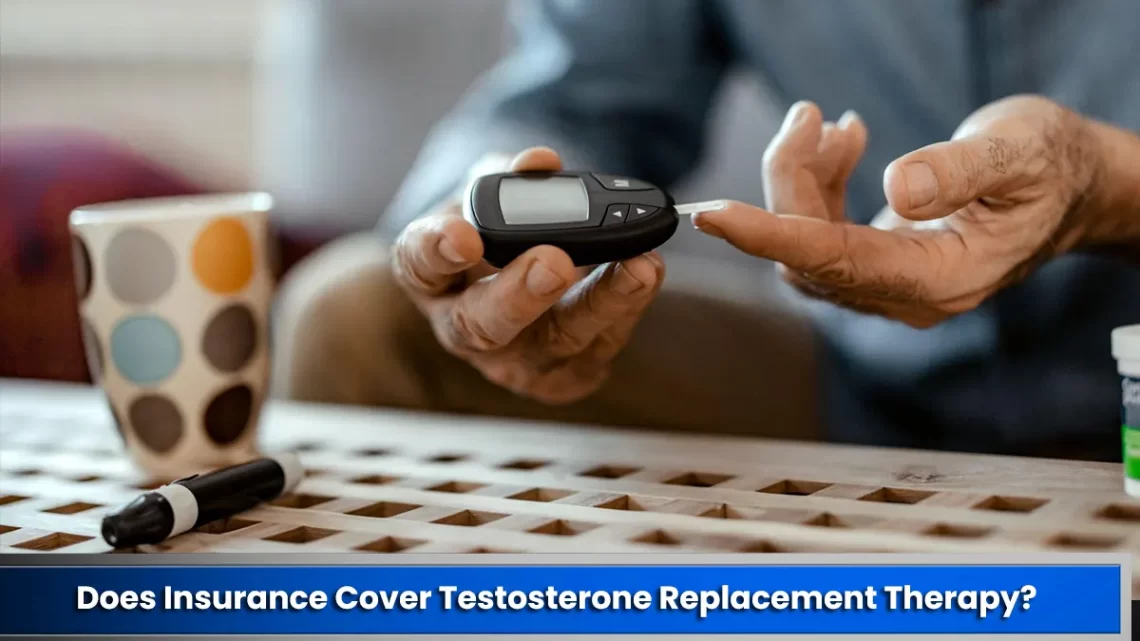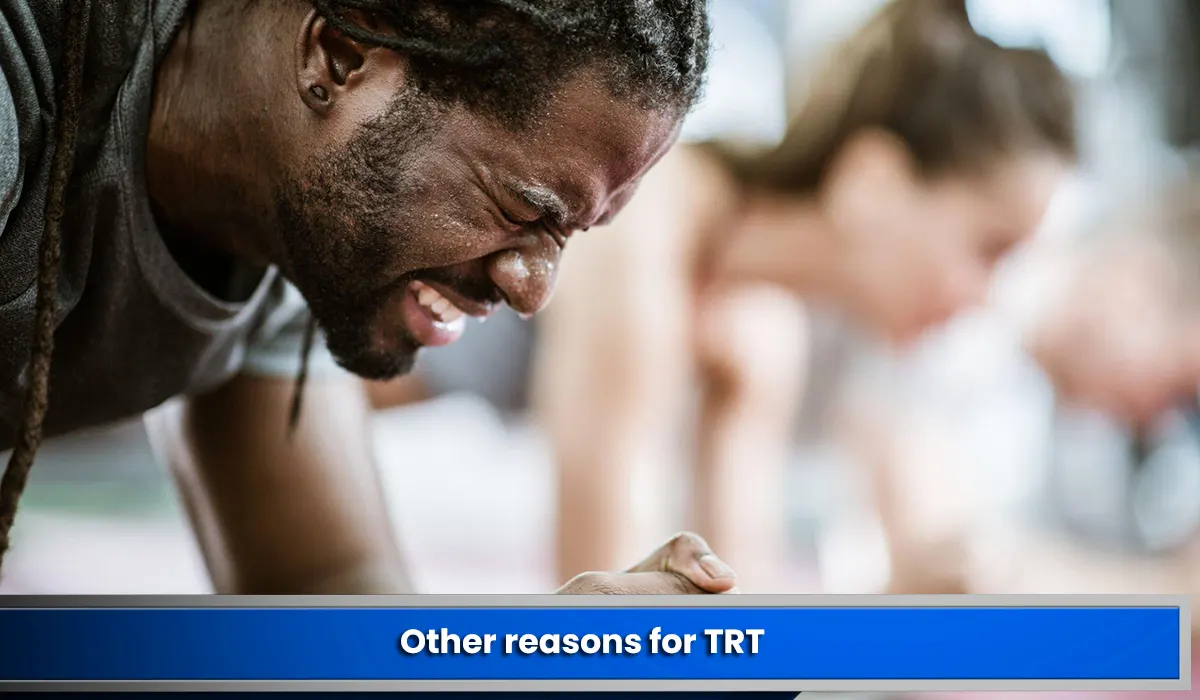Testosterone Questions Answered: Does Insurance Cover Testosterone Replacement Therapy?

Testosterone Replacement Therapy is one of the safest ways to increase Testosterone levels in the body, especially for men suffering from low Testosterone. This safe and well-tolerated treatment can be used as a stand-alone therapy, or in conjunction with other treatments for men diagnosed with Low T. But is Testosterone Replacement Therapy covered by insurance? In this article, we will be discussing what TRT is and we will be answering some questions that are burning in the minds of a lot of people.
What is Testosterone
First and foremost, some fundamentals. The principal male sex hormone generated in your balls is testosterone. It is what truly distinguishes you as a guy. Testosterone regulates several elements of your life, including your physical size and face shape, as well as your sexual drive, mood, and violence.
One of the most important muscle-building hormones in the bodybuilding world is testosterone. Testosterone is a steroid hormone, which means that it is made in another region of your body (in this case, your testes) and then transmitted to target tissues for use. The body converts testosterone into estrogen, the second most important female sex hormone that controls many elements of a woman’s life, such as bone density, mood, and sexual desire. Testosterone is also essential for many men’s health and well-being, including libido and physical mass.
What is Testosterone Replacement Therapy

TRT stands for Testosterone Replacement Therapy. It’s a treatment that dates back to the 1930s, when scientists developed synthetic Testosterone. It is a subset of the wider HRT therapeutic category (Hormone Replacement Therapy).
Certain hormonal imbalances can result in health hazards, unstable situations, and a general reduction in quality of life. If your body naturally declines or ceases producing a specific hormone (endogenous production), external therapy can replace the void. It’s a product that the FDA and Health Canada have approved and that your doctor can prescribe. It has also been thoroughly researched.
Reasons to Start TRT
If you’re considering TRT, you’re presumably considering it for a reason. The good news is that your emotions are not unique to you. The most prevalent reason for men to use TRT is hypogonadism, which affects around 30% of ALL men globally between the ages of 40 and 79. That is only the most common cause.
Hypogonadism and Low Testosterone
The inability of your body to create adequate Testosterone is referred to as hypogonadism. It might be genetic, develop over time, be prompted by mental difficulties, an unhealthy lifestyle, or even stress.
Age to start Testosterone Replacement Therapy
The short answer is that there is no age that requires TRT. However, in your 40s, you are more likely to have low Testosterone symptoms and, as a result, consider TRT.
The long answer is that testosterone levels are strongly connected to age. The range is 35-44 when it begins to decline rapidly. Here’s an illustration:
REMEMBER THAT TESTOSTERONE LEVELS DECLINE WITH AGE.
Is this to say that you can’t have TRT in your twenties? Of course, if your levels of Testosterone are much lower than normal.
Other reasons deca durabolin cycle for TRT

“Oh, I have depression and social anxiety, and I need TRT,” or “Man, my sex life has been a nightmare for the last six months, and I need TRT,” are not acceptable responses.
The only reason to start Testosterone Replacement Therapy is because of low testosterone levels.
There are several articles on the Internet that provide similar lists:Depression;
- a lack of libido;
- Loss of Muscle Mass;
- Balding;
- Erection problems;
- decreased bone mass;
- Body fat percentage rises…
So forth and so on. Those articles are written with one goal in mind: to capture your attention and get you to schedule an appointment with the clinic that delivers the information.
- You may have a low libido because SOMEONE you married years ago gained weight and constantly yells at you.
- A lack of work-life balance can lead to depression.
- Osteoporosis can cause bone density decrease.
- You are genetically predisposed to baldness, and all men in your ancestors were bald by the age of forty.
- Your muscle mass may diminish as a result of your daily activities, which include walking from bed to the kitchen, your car, your office chair, and back, with little exercise and spending 90% of your time sitting.
None of these are compelling reasons to begin TRT, but they are compelling reasons to get your Testosterone levels evaluated. It’s basic information, yet it’s frequently exaggerated in order to persuade more individuals to use TRT. Consider how many private clinics provide it.
Testosterone Replacement Therapy Benefits
Sex Drive Boost
Several research, including this one published in The Journal of Clinical Endocrinology & Metabolism, have proven the effects of low Testosterone on libido. It’s nearly impossible to deny at this point.
TRT has also been shown to help with the disease’s symptoms. A 2019 study summarizing the findings can be found here. Even better, TRT has been shown to help with erectile dysfunction treatment. In practice, this translates to:
- Your erections will improve and be simpler to maintain.
- It becomes simple to obtain an erection in the first place.
- Your sexual urge and libido return to normal;
- Your performance in the bedroom improves, and you may allindiamuseumsummit.com be able to endure for a longer amount of time (a bit, but still).
If you’re between the ages of 25 and 30, you may underestimate the importance of these benefits for 40-50-year-old males. Especially if they’ve spent their entire life cycling AAS with no PCT or ancillaries.
Mood and Self-esteem
Although testosterone has been shown to increase self-confidence, don’t expect it to convert you into a walking magnet for females.
According to the same study, there is no link between higher Test levels and increased sexual intercourse frequency.
If you keep your expectations in check, you’ll get:
- lowered social anxiety
- Small chat is simple to initiate.
- It is easier to suppress dread and anxiety when responding to antagonism.
- You are more confident in your achievements and decisions.
- Making a decision and sticking to it is easier.
Just don’t overdo it; it’s unhealthy and can lead to depression due to high performance expectations. Another study found a connection between it and testosterone levels.
Better Performance in the Gym and Less Fat
Isn’t this the whole objective of steroid use? TRT, on the other hand, works in the same way, with one crucial difference:
TRT Testosterone levels rarely exceed 200mg, despite the fact that the “cycle” can last months, if not years. TRT Testosterone levels rarely exceed 200mg, yet the “cycle” might span months, if not years. TRT dosages of Testosterone rarely surpass 200mg, and the “cycle” can last months, if not years. Bodybuilding doses of Testosterone can range from 300 to 700, and 1-1,5g of Testosterone EW in short cycles; TRT doses of Testosterone rarely exceed 200mg, and the “cycle” can last months, if not years.
You may find our Testosterone in Enanthate Ester instructions here. The proofs and data are all linked. TRT provides similar performance improvements, albeit slightly less pronounced:
- Muscle development;
- Increased strength;
- Increased endurance;
- Improved pumping impact;
- Fat tissue shrinks.
Fat tissue growth is another important factor: the more Testosterone you have, the slower your fat tissue grows.
As a result of the decrease in Estrogen, you are less likely to develop “feminine” adipose tissue sites such as your tummy, breasts, and hips.
This research demonstrates a clear relationship between testosterone levels and fat distribution.
These are the main advantages of TRT. Because it is always being explored, other topics, such as COPD, may be added to the list in the future (pulmonary illness treatment).
Official or Self-Prescribed TRT?
Even while it is legal in the majority of countries, the process itself can be… Not precisely what you’re looking for. The following are some of the reasons why people prefer to self-prescribe TRT:
- Black market testosterone is less expensive than FDA-approved TRT gel components.
- Collecting all of the documents required to begin official TRT may be prohibitively expensive depending on where you live.
- Even routine doctor’s appointments might be too expensive for some people due to variations in income, insurance, and so on.
- Official TRT may not be adequate for your objectives.
- Some doctors may reject to prescribe TRT due to age, analysis results, limits, legal issues, and other factors. Nowadays, half of medicine is paperwork, which some people despise.
Money, bureaucracy, and the rule of law The three pillars of the technique “Fuck it, I’ll prescribe it myself.”
It is crucial to remember that there is no practical difference between self-administered TRT and doctor-administered TRT. Here’s a study that demonstrates how little the differences are.
Before choosing on the latter, learn more about the compounds you may require.
Also, don’t start despising hospitals (it’s never a good idea). On occasion, Health Canada issues nice-wrapped warnings concerning harmful pseudo-TRT medicines. Some are poison, while others are anabolic steroids disguised as other substances.
If you want a basic TRT, most AAS will be overkill.
Is Testosterone Replacement Therapy covered by Insurance?
Testosterone replacement therapy is a prescription medication that is occasionally funded by insurance. The type of coverage you receive will be determined by your plan, the business that provides your insurance, and the specific benefits package in which you are enrolled.
To find out if testosterone replacement therapy is covered by your insurance, call your employer’s human resources department or your health care provider and enquire about the types of therapies covered under your plan.
If testosterone replacement therapy is not covered by your insurance, you should contact your clinician to see if there are any other options. Then you must evaluate whether it is worthwhile to pay for the treatment yourself.
Testosterone Replacement Therapy Cost
The cost of testosterone replacement therapy varies according to the type of treatment required, the dosage administered, and the frequency with which it is administered. The cost of a TRT may vary depending on a variety of factors. The first factor to consider is your location. TRT costs vary by country because each country has its own currency. Second, the cost will vary depending on the type of treatment you require. Third, the price of TRT fluctuates according on how much you use it and how frequently you need it. The cost could range from $20 per month to tens of thousands of dollars each year.
